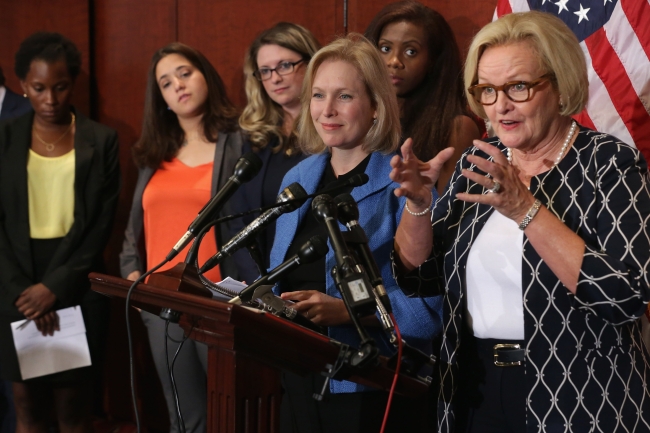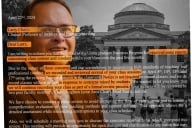You have /5 articles left.
Sign up for a free account or log in.

Sen. Claire McCaskill (right) and Sen. Kirsten Gillibrand with survivors of campus sexual assult at a news conference about new legislation aimed at curbing sexual assults on campuses
Getty Images
WASHINGTON -- A bipartisan group of eight U.S. Senators on Wednesday unveiled legislation aimed at holding colleges more accountable for preventing and dealing with the sexual assaults that occur on campuses.
The lawmakers, led by Senator Claire McCaskill of Missouri and Senator Kirsten Gillibrand of New York, both Democrats, said that the bill responds to a national problem of campus sexual assault and the publicized cases of colleges mishandling investigations.
“If you are a young woman who goes to college, you are more likely to be sexually assaulted than if you didn’t,” Gillibrand said. “The price of a college education should not be that one in five students is sexually assaulted." (That one-in-five figure, though widely cited, is questioned by some.)
The legislation would require all colleges to conduct anonymous surveys of students about their views of sexual assault on campuses. The results of the so-called “climate surveys” would then be published online for prospective students to see. The White House has recommended that colleges conduct such evaluations, but the bill would make them mandatory.
The goal is to gauge the actual prevalence of sexual assault or other troubling behaviors on an individual campus, McCaskill said, rather than rely only on the number of reported incidents for such a widely underreported crime.
Senator Marco Rubio, a Republican of Florida who is a co-sponsor of the legislation, said that providing that information to the public is key for students choosing among colleges.
“Parents and students need to know that the difference in colleges isn’t just in programs or graduation rates, but it’s also in safety” he said.
The bill would require that the colleges designate a confidential adviser who will help coordinate support services and accommodations for victims. Colleges would also have to provide special training for the personnel who handle sexual assault cases on their campuses.
In addition, colleges would face stiffer financial penalties for mishandling sexual assault cases. The new measure would allow the Education Department to impose a fine as high as 1 percent of a college’s operating budget for violating the bill’s new provisions as well as existing requirements of Title IX of the Education Amendments of 1972.
Gillibrand said the new fines were aimed at giving the Education Department more leverage in its investigations of how colleges handle sexual assault cases. At a large, wealthy institution like Harvard University, she noted, such a fine could be as large as $4.2 million.
The federal government can currently sanction a college violating Title IX only by stripping it of all federal funding, a penalty McCaskill said was unrealistic. It has never been used.
It would also increase the maximum fine for a Clery Act violation from $35,000 to $150,000 per violation. Those violations would include failing to properly report campus crimes on campuses or not providing sufficient warning of an ongoing safety threat.
Flanked by several victims of sexual assault at a news conference here Monday, McCaskill, Gillibrand and other lawmakers from both parties said that they were troubled by how colleges had handled allegations of sexual assault.
Andrea Pino and Annie Clark, co-founders of End Rape on Campus, praised the new legislation.
“The institutional betrayal these students face is almost worse than the assault,” said Clark. She recounted that when she told administrators at the University of North Carolina at Chapel Hill that she had been assaulted, she was told that rape is like a football game and she should go back and review what she did wrong.
The legislation would also prohibit colleges from penalizing a student who, in the course of reporting a sexual assault, reveals a student conduct violation such as underage drinking.
The bill would also codify into law things that the Obama administration has already done, as its Education Department has taken a tougher line on campus sexual assault. For instance, the legislation would mandate that the department to publicly identify the colleges under investigation for sexual assault and the findings from those investigations.
In addition, the legislation would require colleges to adjudicate sexual assault cases using the same processes for all students. That provision is meant to stop college athletic departments from overseeing allegations of sexual assault, a practice that came to light in McCaskill’s survey earlier this month.
The president of the National College Athletic Association said at the time that he was concerned that about 20 percent of the survey respondents reported that their athletic department oversaw sexual assault investigations.
Notably absent from the bill, however, is a controversial proposal to codify into law the standard of evidence that colleges must use in adjudicating sexual assault cases. The Obama administration in 2011 told colleges to adopt a “preponderance of the evidence” standard, a lower burden of proof than the “clear and convincing” standard that many institutions had been using.
But such guidance could be overturned by a future administration. McCaskill had previously indicated that she wanted to include the lower evidentiary standard in federal law. Victims’ advocates lost a bid to make such changes during the reauthorization of the Violence Against Women Act last year. Some civil libertarians argue that the lower standard is unfair and violates the due process rights of students accused of sexual assault.
The bill attracted a wide range of co-sponsors. Aside from McCaskill, Gillibrand and Rubio, Senator Charles Grassley, a Republican of Iowa, Senator Kelly Ayotte, a New Hampshire Republican, Senator Dean Heller, a Republican of Nevada, and Senator Richard Blumenthal, a Connecticut Democrat, also signed on.
“Very rarely does a bill become a truly collaborative process, and this bill has been truly collaborative and bipartisan,” McCaskill said.
McCaskill said that the goal was to get floor time in the Senate in September, but that she had not received any commitment from Senate leadership about firming up that timeline.
Skepticism From Colleges
Terry Hartle, the senior vice president for government and public affairs at the American Council on Education, said that colleges would embrace efforts in the bill to clarify who is a confidential adviser on a campus. However, he said institutions of higher education had concerns about large parts of the legislation.
“On balance, this is a pretty heavy-handed approach that starts with an assumption that more detailed federal requirements will solve this very difficult problem of campus sexual assault,” he said.
Hartle said that there wasn’t any evidence that climate surveys are effective in reducing campus sexual assault. Further, he said, he was skeptical of the Education Department’s ability to administer a survey that fits all different types of campuses.
“This is a far more complicated issue than people want to believe,” he said.
Colleges are also concerned about the increased fines, Hartle said. Not only is the 1 percent standard “a number pulled out of the air,” he said, but the stiffer fines “reflect a view that colleges and universities don’t want to deal with this issue. And that is just not true.”
He also noted that the top Department of Education official in charge of enforcing Title IX testified before Congress last month that she had sufficient power under the existing law to compel colleges to correct problems.
McCaskill has tangled with the American Council on Education over the past several months in her study of campus sexual assaults on college campuses. The group twice refused her request to provide a presentation it sponsored to colleges that outlined the risks associated with her survey. It eventually turned over those records.
“I’m going to be watching very carefully to see how that organization handles advocacy around this bill,” McCaskill said Wednesday, adding that she thought group’s guidance to universities about her survey and their criticism of it were both “inappropriate.”
McCaskill also drew a comparison between colleges’ response to her scrutiny and her work as a government auditor presenting findings against an agency.
“There’s two ways to handle it: you can circle the wagons, deny it, and fight it,” she said. “Or you can join forces, and say, ‘Thank you for the heads-up; we need help in this area.’ ”








